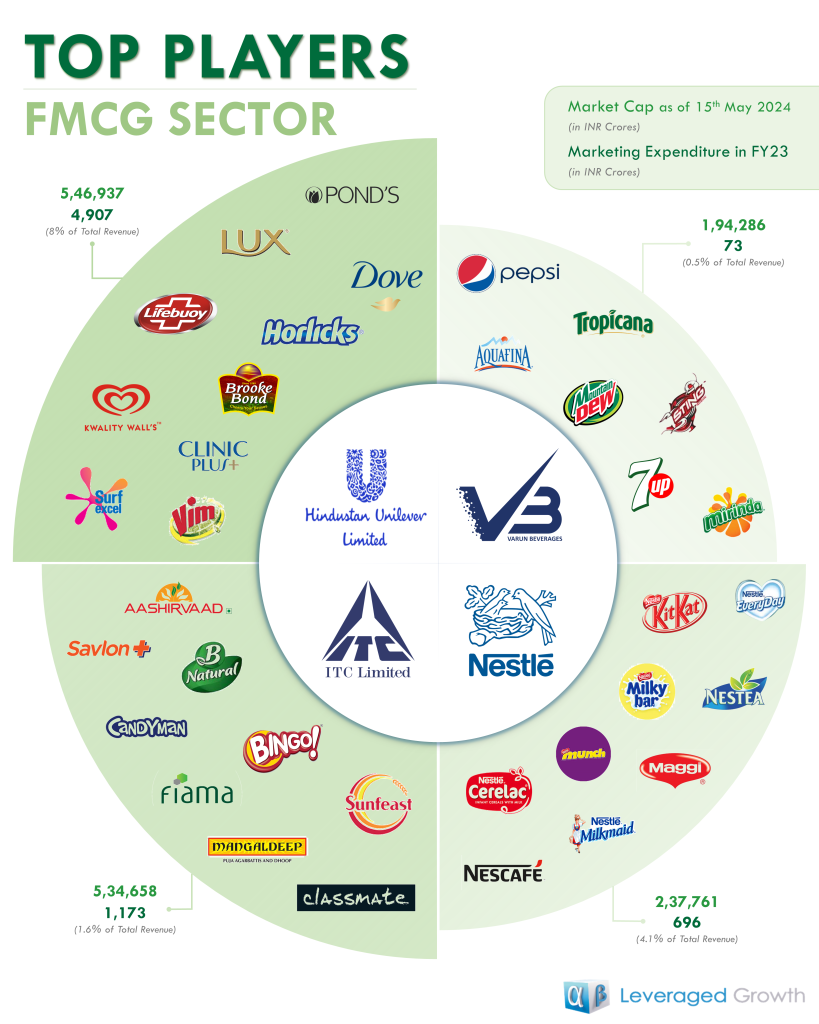The Fast-Moving Consumer Goods (FMCG) sector includes a diverse array of products known for their rapid sales and relatively low prices. This sector covers essential categories such as Food & Beverages, Household & Personal Care, and Healthcare. The term ‘fast-moving’ refers to the quick turnover of these products from manufacturing through distribution and marketing channels to the end consumer. The sector plays a crucial economic role, ranking as the fourth-largest in the country. It is also a major employer, providing jobs for ~3 million people, which accounts for ~5% of the nation’s total factory workforce.
The leading companies in India’s FMCG industry are Hindustan Unilever, ITC, Nestle India, and Varun Beverages, which are briefly discussed below.

Hindustan Unilever
Hindustan Unilever Limited (HUL), a behemoth in the FMCG sector in India, is a subsidiary of the global consumer products giant Unilever. It was established in 1933 as Lever Brothers India Ltd and later merged with Hindustan Vanaspati Mfg. Co. Ltd and United Traders Ltd in 1956. It offers a variety of products in categories such as foods, beverages, cleaning agents, personal care, and water purifiers. The company offers its products with over 9 million retail stores witha pan indian presence.
ITC
Established in 1910, ITC transformed from a tobacco-centric company into a diversified conglomerate, expanding its presence in various sectors such as FMCGs, personal care products, agricultural commodities, paperboards, packaging, branded apparel, stationery, hotels, agarbattis, etc. Additionally, it expanded its branded packaged foods segment to include luxury chocolates, ghee, dairy and frozen food products. Its operations span across North America, Europe and Southeast Asian countries.
Nestlé India
Nestle India, a subsidiary of the Swiss multinational Nestle S.A., boasts a rich history of over a century in the Indian subcontinent. As the third-largest Fast-Moving Consumer Goods (FMCG) company in India, it holds a significant market capitalization of ₹2.37 lakh crore (as of March 8, 2024). The company leverages a strategic network of eight manufacturing facilities and four branch offices across the nation. Established in India in 1961, Nestle played a pioneering role by setting up its first factory in Moga, Punjab, and actively contributing to the development of the local milk economy. Today, it manufactures and markets a diverse portfolio of food and beverage products, catering to both culinary needs and direct consumption.
Varun Beverages
Established in 1995, Varun Beverages Ltd (VBL) is a key player in the Indian beverage market, holding an exclusive franchise agreement with PepsiCo to bottle and distribute its products throughout India. This partnership makes VBL the backbone of PepsiCo’s Indian beverage operations, controlling a massive 85% of their sales in the country. Their expansion into manufacturing PepsiCo’s Kurkure Puffcorn snacks hints at a growing role beyond beverages. With a strong market position, a loyal partner in PepsiCo, and exclusive bottling rights secured until 2039, VBL appears well-positioned for continued success in the Indian market.
Recent Trends
In recent years, the FMCG industry has seen a significant shift towards sustainable packaging practices driven by increasing consumer awareness and technological advancements. Key trends include the use of recycled materials, adoption of lightweight packaging, enhanced biodegradability, and a rise in reusable packaging models. These trends reflect the industry’s commitment to reducing its ecological footprint and meeting the demand for more environmentally friendly products.
However, the shift towards sustainable packaging comes with several challenges. The higher cost of sustainable materials is a barrier, particularly for small and medium-sized enterprises (SMEs). Additionally, educating consumers about the benefits and proper disposal of sustainable packaging has become necessary to maximize its impact. Moreover, the current supply chain and logistics environment is not adequately equipped to effectively implement these sustainable solutions.
Despite these challenges, there are substantial opportunities for innovation in sustainable packaging. Companies that invest in eco-friendly solutions can enhance their brand reputation, comply with regulatory requirements, and attract environmentally conscious consumers. With consumers becoming environmentally conscious and the government bringing in stringent regulations, investing in eco-friendly solutions is not only an environmental requirement but also a business requirement. The FMCG sector’s shift towards sustainability not only aids in environmental conservation but also sets a new standard in packaging practices.
Contributor: Team Leveraged Growth



